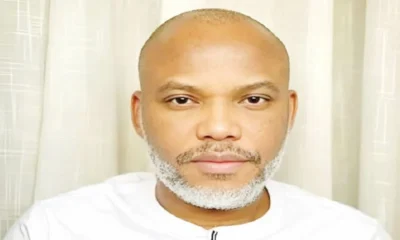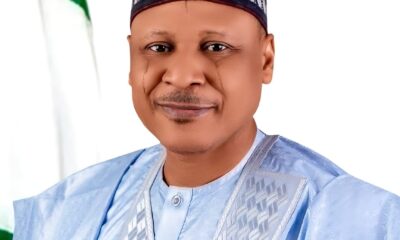News
FCT residents share concern over risky crossing of highways, frequent deaths
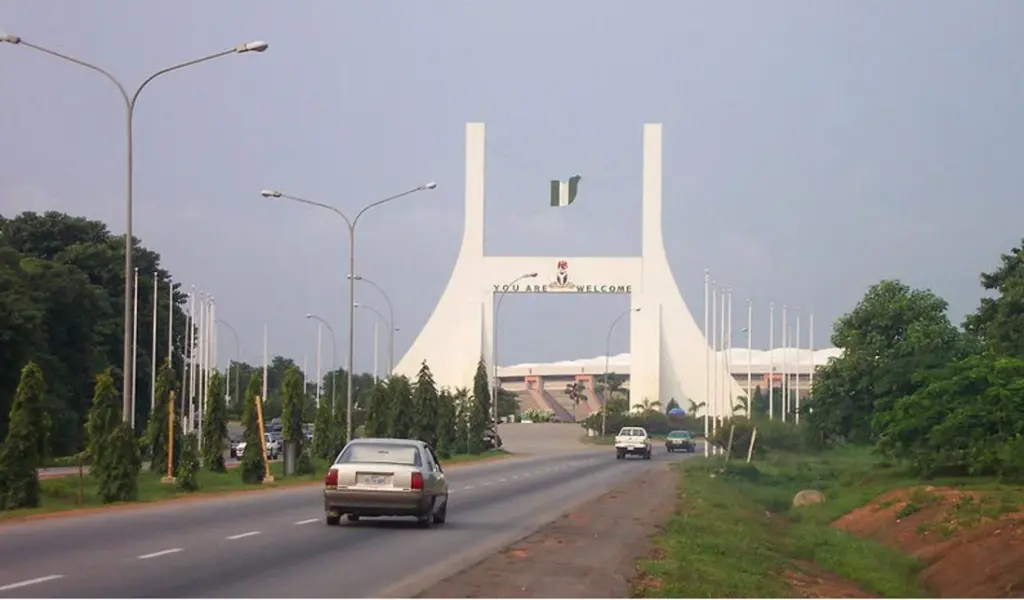
Crossing the expressways without making use of pedestrian bridges has become a daily practice in the Federal Capital Territory, FCT, Abuja, and its environs.
Ekwutosblog also gathered that residents abandon similar bridges in locations like Gwarinpa, Gwagwalada, Lugbe, Berger, NICON junction, Wuye, Nyanya and Mararaba, an outskirt of the FCT domiciled in Nasarawa state.
Insead, the pedestrian bridges now serve as markets, display stands for wares and resting places for homeless persons.
Many lives have been lost in the FCT and its environs as residents venture to cross the expressway instead of using pedestrian bridges across the nation’s capital city.
However, in some instances, the victims had no choice, as there was no pedestrian bridge available at the point they had to cross the expressway.
Ekwutosblog gathered that in April, a young man who was on his way to work was knocked down as he tried to cross the expressway at Berger Junction in the Federal Capital Territory, Abuja. The young man died on the spot.
Eyewitnesses said the young man’s office was just across the road, and as there was no pedestrian bridge at that particular location, he decided to cross the expressway to get to his place of work.
Unfortunately, he was knocked down by a vehicle moving at top speed.
Also, in early May, another young man who decided to cross the expressway, instead of using the pedestrian bridge, at the Galadimawa Junction along the Kubwa Expressway in Abuja, was killed by a fast moving vehicle.
Ekwutosblog reports that the driver of the vehicle, who was nearly mobbed by a crowd that gathered at the scene of the incident, lamented that he did not see the victim until it was too late, as he did not expect anybody to cross the expressway, when there is a pedestrian bridge available.
The driver’s explanations, however, calmed down the angry crowd, and a group of policemen stationed at a police post at the junction admonished the gathering on the need to use pedestrian bridges, instead of taking the risky option of crossing the expressway.
The pedestrian bridges are considered key infrastructure in modern road projects, especially in densely populated urban centres to ensure safety on the roads.
Unfortunately, most residents in the city neglect this safety measure and prefer crossing the highways, thereby slowing down vehicular movement.
Most expressways in Abuja are constructed and divided with concrete barricades, which points against highway foot crossing, but residents usually jump over these barricades to cross the road.
Residents jump down from the barricades and would not be able to control themselves in the middle of the road until a driver applied the brake.
A Non-Governmental Organisation, Uche Collins Foundation, has sought partnership with relevant stakeholders to increase sensitisation on the use of pedestrian bridges in the territory’s highways.
The Foundation stressed that many of the pedestrian bridges in the nation’s capital were being seen as monumental decorations rather than being used by pedestrians for their safety.
“As an NGO, we feel the need to increase sensitisation and awareness of this public facility, hence reaching out to good spirited individual, organisations to partner with us in driving this message,” the Foundation said.
Speaking with residents in the FCT, Ekwutosblog gathered that many road users are aware of the risk of crossing the roads without the use of the pedestrian bridges.
Some of the residents explained that they cross the highway when they are in a hurry to work or have urgent appointments, adding that using the pedestrian bridge could be stressful, as they don’t have the required time to complete such a journey.
A resident of Nyanya, Peter Adebayo, who lives in a street nearby to a pedestrian bridge, described the act as ‘open-source to death’ stressing that those who cross the highway are risking their lives.
“If you cross the expressway without using the pedestrian bridge, it sometimes leads to accidents because the highways are meant for vehicular movement and not for footpaths.
“Residents who engage in the practice risk their lives, especially during rush-hours in the morning.
“Highway is a motor lane at high speed and it is not safe to cross the highway on foot, those crossing because they are in a hurry are endangering their lives.
“I usually take my time whenever I wanted to cross the expressway because I think it is the safest thing for me to do, though on the other hand the government is also endangering the citizens because they site pedestrian bridges at the wrong place, even to trek from bus stops to pedestrian bridge is another journey and I think that’s why people usually cross the highway because they don’t have the required time to cover up,” he stated.
In the same way, another resident in Kugbo, Abuja, Mr Ola Abiola criticised the government and contractors for building pedestrian bridges where it is not useful.
Abiola said, “Most pedestrian bridges in Abuja are not built at the right place, for instance in Wuye.
“Government needs to ensure proper supervision of projects that concern human life.”
A resident, Ephrain Ager, who Ekwutosblog witnessed crossing the Musa Yar-Adua Expressway, Airport Road, when asked the reason for taking such risk, agreed that it was not the right thing to do.
He noted that people would rather cross the road because most of the bridges are situated at a distance of about 1 kilometre from the bus stop.
“Yes, we have seen many people lose their lives here on this road,” he said.
Another resident, Ngozi Nnanna, however, said safety should always come first irrespective of the distance of the pedestrian bridges.
“I am taking the pedestrian bridge because it is safer. Of what use are the bridges constructed by the government if they are ignored by pedestrians,” she asked.
According to a taxi driver, Ikechukwu Ubani, pedestrians underrate the high speed of moving vehicles on the express roads.
Ubani said, “They usually think moving vehicles are far but not knowing that the distance can be covered in a few seconds and they run into the road and they get hit.”
Efforts by Ekwutosblog to speak with the Federal Capital Territory Administration, FCTA, on measures to enforce the compulsory usage of pedestrian bridges across the FCT, and other concerns raised by residents proved abortive as several calls put across were not responded to.
News
Bosso replaces Danjuma as Imo Police Command CP
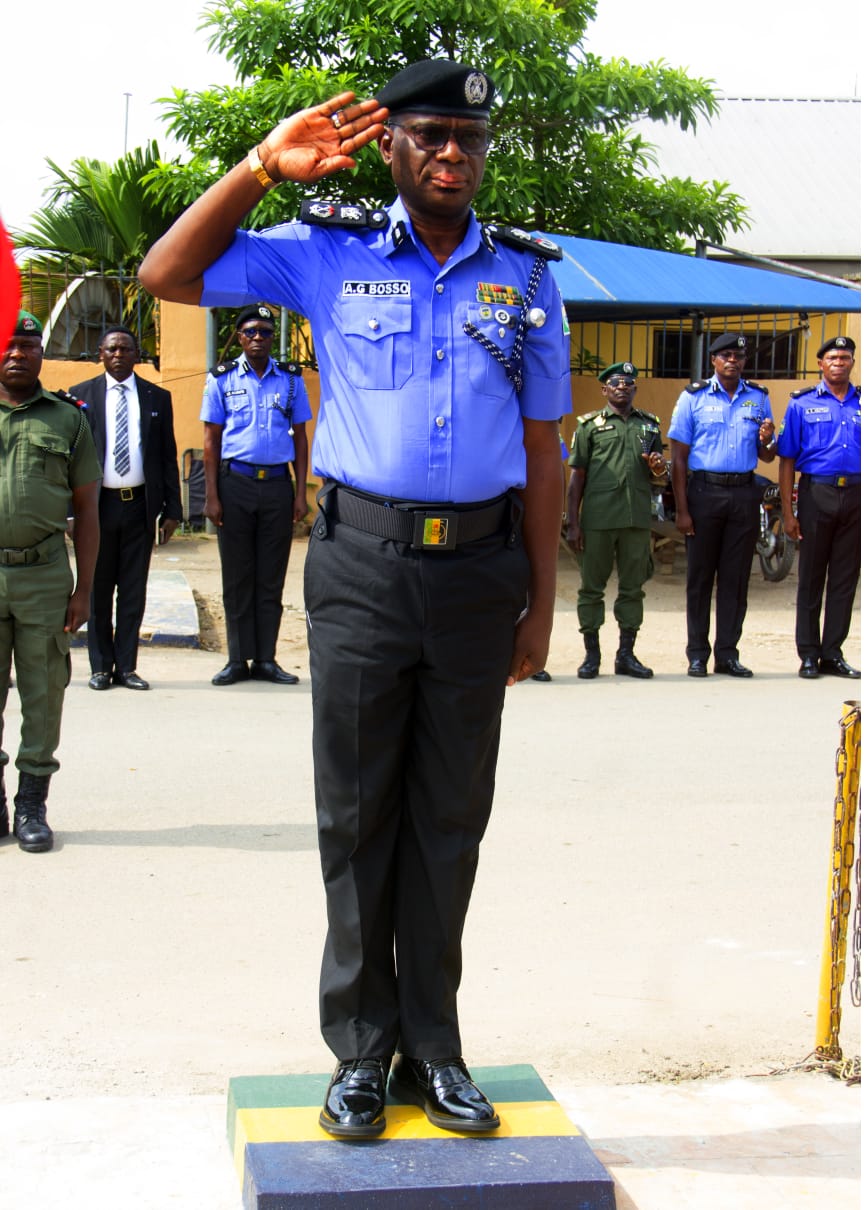
The Imo State Police Command, Owerri, has a new Police Commissioner in the person of Audu Garba Bosso, who replaced Aboki Danjuma, the outgoing Police Commissioner. Danjuma was recently promoted to the rank of Assistant Inspector General of Police (AIG) and posted to Force Headquarters, Abuja.
Upon assumption of duty, CP Bosso called on sister security agencies, stakeholders, and all residents to collaborate with the police in tackling crime and social vices.
He stressed that community-based policing, intelligence-led operations, and a people-friendly approach will guide his administration, with strict adherence to the rule of law and respect for human rights.
In a brief biography made available to journalists by the Command’s spokesperson, Henry Okoye, it was revealed that CP Bosso was born on December 31, 1967, in Bosso, Niger State.
He enlisted into the Nigeria Police Force on June 10, 1994, as a Cadet ASP, Course 18/1994.
Revealing his academic history, Okoye stated that CP Bosso holds an NCE in Geography/Biology, a B.Sc.Ed in Biology, and an M.Sc in Law Enforcement and Criminal Justice from Ahmadu Bello University, Zaria. He is also a member of the National Institute of Policing Studies (MNIPS).
In the course of his career, he has attended key professional courses, including PMF Mobile Training School, Citizenship and Leadership Course, Community Policing Course, TLCC, and SLCC, which have shaped his strategic and community-oriented policing philosophy.
The command’s spokesperson added that before his recent deployment to Imo State, CP Bosso served as DPO in over twenty-two divisions nationwide across Sokoto and Kwara State Commands, including Bale Gudu, Dange-Shuni, Wamako, and Kebbe Divisions in Sokoto State, as well as ‘B’ Division, Surulere, Ilorin, Kwara State Command, among others.
“He also held strategic appointments across several state commands, which include: CSP Administration, Kwara State Command; 2i/c Ilorin Metro Area Command, Kwara; 2i/c CID, Katsina State Command; AC Provost Marshal, Force Headquarters, Abuja; Area Commander, Saki, Oyo State Command; Area Commander, Ikere-Ekiti, Ekiti State Command; ACP Administration, Enugu State Command; Area Commander, Iyekogba, Edo State Command; Director CPTU, Police Service Commission, Jos; Director Finance & Administration, POLAC Wudil, Kano State; DCP G.I FCID Annex, Gombe State; DCP Operations, Borno State Command; and CP G.I FCID Annex, Kaduna State, before his posting to Imo State,” Okoye stated.
The new Commissioner has called on all Imo residents to actively partner with the Police and other security agencies through timely information sharing and participation in community policing initiatives, assuring the public of his commitment to protecting lives and property, maintaining peace, and fostering a people-friendly policing culture across the state.
News
After Bitten To De@th By Snake, Another Snake Reportedly Found Under Ambulance Carrying Nanyah’s Remains Back Home

A London-based teacher and culture ambassador, Uche Nworah, has shared a shocking incident that reportedly occurred while the remains of late singer Ifunanya Nwangene popularly known as Nanyah, were being transported to Enugu.
Nworah, who claims to have been Facebook friends with Ifunanya’s uncle for years, revealed details he says were shared directly by her uncle during a phone conversation.
Contrary to earlier reports circulating on social media, Nworah clarified that Ifunanya did not reside on the ground floor of her Abuja apartment but on the second floor.
This, he noted, raises questions about how snakes could have accessed her living space, as ground-floor access via drains or toilets would not apply.
According to Nworah, the ambulance carrying Ifunanya’s body broke down while en route to Enugu, in line with her father’s wishes.
The breakdown caused a delay as a replacement vehicle had to be called to continue the transport.
While waiting for the replacement ambulance, a snake was reportedly found under the broken-down vehicle.
Sharing the uncle’s account on Facebook, Nworah wrote:
“…Beyond social media claims, I received a call from Ifunanya’s uncle, who has been my Facebook friend for many years. During our conversation, he made disclosures that some may consider disturbing, while others may view them as mere coincidences.
He stated that contrary to widespread reports on social media, Ifunanya did not live on the ground floor of her residence but on the second floor. This raises questions about how snakes could have gained access to her apartment. Had she lived on the ground floor, one might argue that the snakes entered through drainage systems or toilets, but this explanation appears less straightforward given that she lived on the second floor.
He further recounted a strange incident that occurred while her body was being transported to Enugu State in an ambulance, in accordance with her father’s wishes. According to him, the ambulance conveying her remains broke down along the Abuja Expressway, necessitating calling for a replacement vehicle. During the wait he said, a snake was discovered beneath the broken-down ambulance and was subsequently killed.
While these incidents may be entirely unrelated and purely coincidental, they nonetheless raise questions and leave room for reflection.”
The revelation has sparked discussion online, with many questioning the unusual events surrounding the singer’s death.
See below;
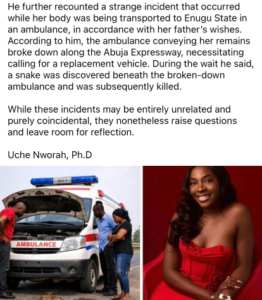

Screenshot
News
FMINO PRESS RELEASE: CAC AT 35 YEARS HAS BECOME A PILLAR OF NIGERIA’S ECONOMIC CREDIBILITY – INFORMATION MINISTER
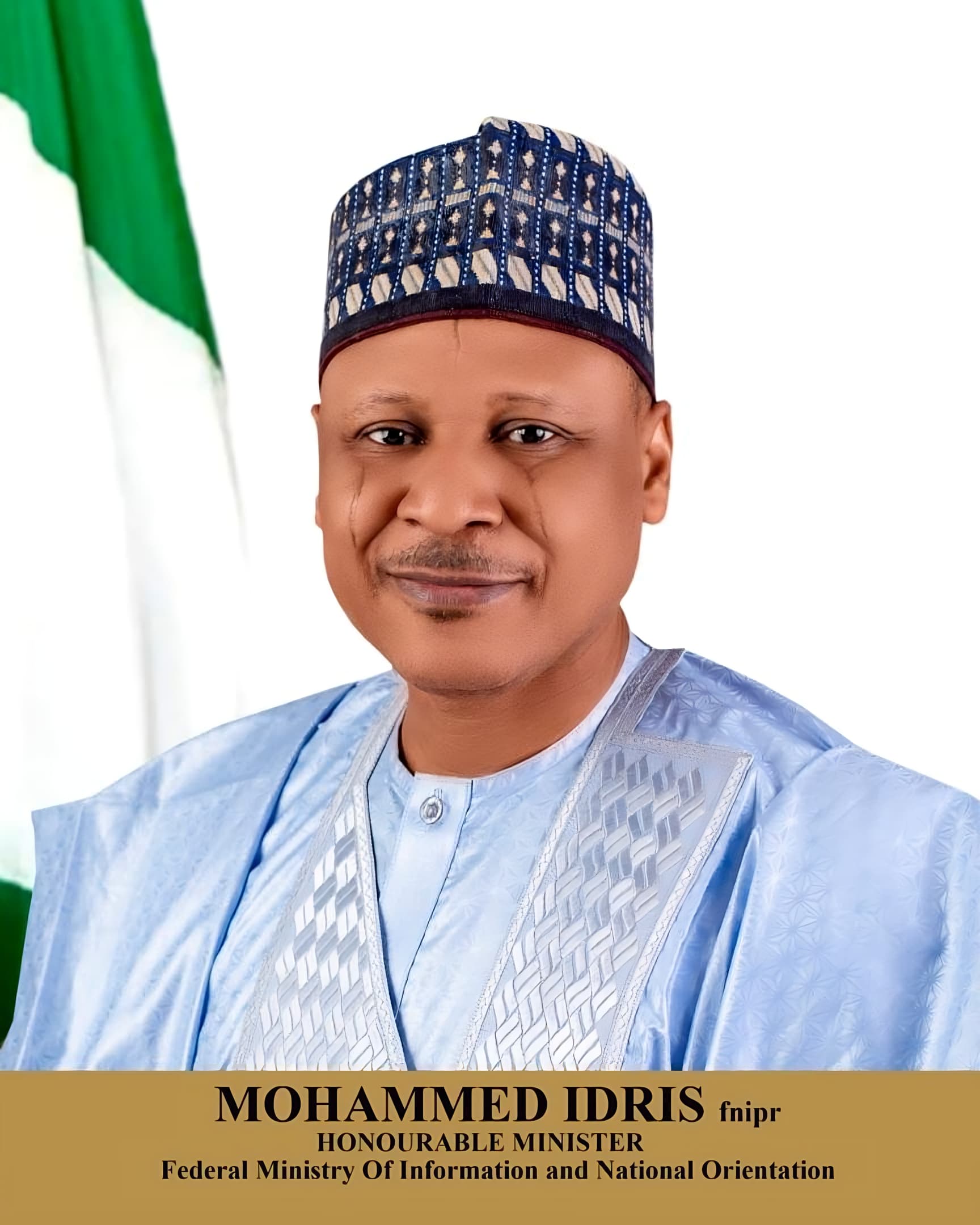
The Honourable Minister of Information and National Orientation, Mohammed Idris, has reaffirmed the Federal Government’s commitment to transparency, institutional reform, and ease of doing business, describing effective inter-agency collaboration as critical to the success of President Bola Ahmed Tinubu’s Renewed Hope Agenda.
The Minister made this known while receiving the Registrar-General and Chief Executive Officer of the Corporate Affairs Commission (CAC), Hussaini Ishaq Magaji, SAN, who led the delegation of the Commission on a courtesy visit to the Ministry ahead of the Commission’s 35th anniversary celebration (CAC@35).
Idris commended the Corporate Affairs Commission for what he described as remarkable institutional reforms that have repositioned the Commission as “a key driver of Nigeria’s business environment and economic credibility.” He noted that CAC’s transformation, particularly through technology and digitisation, aligns strongly with the Federal Government’s broader reform agenda.
The Minister praised CAC’s role in improving the ease of doing business, strengthening corporate governance, and enhancing investor confidence, stressing that such reforms are vital to national development. He also acknowledged the Commission’s contribution to Nigeria’s recent delisting from the Financial Action Task Force (FATF) grey list, describing it as a major milestone that reflects growing global confidence in Nigeria’s regulatory and transparency frameworks.
According to him, the progress recorded under the Tinubu administration, including rising foreign reserves, easing inflation, improved investor confidence, and economic stabilisation, cannot be fully told without recognising the role of reform-driven institutions such as the Corporate Affairs Commission.
The Minister further encouraged CAC to intensify public engagement and advocacy to ensure Nigerians are fully informed about the Commission’s innovations, services, and achievements. He assured the Commission of the Ministry’s support in amplifying its reforms and programmes through strategic communication and public enlightenment.
Earlier, the Registrar-General of CAC, Hussaini Ishaq Magaji, SAN, said the courtesy visit was to formally invite the Honourable Minister to the Commission’s 35th anniversary celebration and to present a scorecard of reforms achieved under the current administration.
He explained that CAC has transitioned from a largely manual, location-bound registry to a fully digital, technology-driven institution, with services now accessible in real time from anywhere in the country. He disclosed that the Commission has expanded its digital offerings from 33 services to over 100 online services, deployed artificial intelligence for business name reservation and registration, and introduced Application Programming Interface (API) services to support banks, embassies, security agencies, and other institutions.
The Registrar-General highlighted the operationalisation of the Beneficial Ownership Register, noting that it has strengthened transparency, boosted investor confidence, and positioned Nigeria as a global reference point for corporate disclosure. He added that CAC’s reforms have helped bring over four million informal businesses into the tax net, improved security by registering POS operators, and supported small and medium-scale enterprises through free business registrations in partnership with relevant agencies.
He also announced the Commission’s upcoming partnership with Google to further strengthen its digital infrastructure and service delivery, as well as the launch of an AI-powered public support platform to guide users on corporate and regulatory matters.
He thanked the Honourable Minister for the warm reception and support, and formally invited him to the CAC@35 anniversary celebration scheduled for February 9, 2026.
The event was attended by the Permanent Secretary of Information and National Orientation, Mr Ogbodo Chinasa Nnam, Director National Archives, Dr. Evelyn Odigboh, Director Public Relations and Protocol, Dr. Haruna Suleiman, and the Special Assistant, Administration to the Honourable Minister, Dr. Sunday Baba, fnipr.
Rabiu Ibrahim
Special Assistant (Media) to the Honourable Minister of Information and National Orientation.
Wednesday, February 4, 2026
-
Business1 year ago
US court acquits Air Peace boss, slams Mayfield $4000 fine
-

 Trending1 year ago
Trending1 year agoNYA demands release of ‘abducted’ Imo chairman, preaches good governance
-

 Politics1 year ago
Politics1 year agoMexico’s new president causes concern just weeks before the US elections
-

 Politics1 year ago
Politics1 year agoPutin invites 20 world leaders
-

 Politics1 year ago
Politics1 year agoRussia bans imports of agro-products from Kazakhstan after refusal to join BRICS
-
Entertainment1 year ago
Bobrisky falls ill in police custody, rushed to hospital
-
Entertainment1 year ago
Bobrisky transferred from Immigration to FCID, spends night behind bars
-
Education1 year ago
GOVERNOR FUBARA APPOINTS COUNCIL MEMBERS FOR KEN SARO-WIWA POLYTECHNIC BORI









